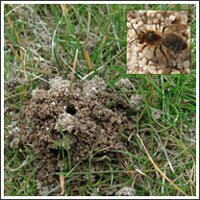Mining bees are generally harmless as they do not produce a sting unlike other types of bees. Mining bees are solitary creatures and make their nests under the lawn or pathway and their only crime is that they produce small mounds of heaped soil (usually on light sandy soils). The small conical heaps can look very similar to ant hills, but the mounds constructed by mining bees have a small crater on top.

Control is rarely necessary as the heaps are very small and can be quickly scattered with a brush or similar implement before mowing the lawn. Insecticides are available for control , however action is very rarely needed and justified.
Mining bees produce small conical mounds of earth at the tunnel entrances as they construct their underground nest. Damage is normally very minimal and action is rarely required
Mining bees, belonging to the Andrena genus, are solitary bees often mistaken for pests or nuisances in gardens and lawns. However, it’s essential to understand their behavior, ecological importance, and ways to manage them without causing harm.
Understanding and Managing These Lawn Visitors
Description: Mining bees are so named because of their tendency to dig burrows in the ground. These bees are relatively small, often measuring between 8 to 17mm, with a black, furry appearance interspersed with areas of orange or brown.
These solitary bees nest in the ground, creating tunnels and chambers where they lay their eggs. The sandy or loose soil in gardens or lawns often provides the perfect nesting ground for these bees.
Ecological Importance:
- Pollination: Mining bees play a vital role in pollinating various plants, especially spring flowers. Their foraging activities help in the reproduction of many wildflowers and crops.
- Food Source: They serve as a crucial food source for various birds and other predatory insects, maintaining the ecological balance.
Misconceptions: Many homeowners perceive mining bees as a threat, primarily because of the small mounds of soil they create on lawns while burrowing. However, these bees are non-aggressive and rarely sting. Their presence is often seasonal, with most activity observed during the spring.
Managing Mining Bees in Lawns:
- Tolerate When Possible: Given their ecological importance and non-aggressive nature, it’s best to tolerate mining bees when they’re present in small numbers. Their burrowing activities can even aerate the soil, which can be beneficial.
- Watering the Lawn: Mining bees prefer dry soil for their nests. Regular watering can deter them from establishing nests in the lawn.
- Lawn Maintenance: Regular mowing and lawn maintenance can make the area less attractive for mining bees. However, avoid mowing when the bees are actively flying around.
- Natural Repellents: Planting bee-repelling plants, such as citronella or marigold, can deter mining bees from setting up their nests in your garden.
- Consult a Specialist: If you believe there’s a significant infestation, it might be worth consulting with a local beekeeper or an entomologist. They can offer insights and may even relocate the bees without harming them.
Conclusion: Mining bees, while often misunderstood, play a crucial role in our ecosystem. Before considering them as pests, it’s essential to understand their behavior and ecological significance. In most cases, a harmonious coexistence is possible with minimal intervention. If management is necessary, always opt for non-harmful methods to ensure these beneficial insects continue to thrive and support our environment.

